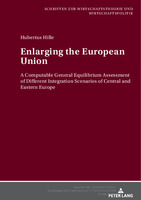Enlarging the European Union
A Computable General Equilibrium Assessment of Different Integration Scenarios of Central and Eastern Europe
Abstract
European politics has provided clear signals: the next round in the process of EU enlargement with the accession of the Central and Eastern European countries (CEEC) will come. Since expectations concerning the costs and benefits of integration are varied, it is our aim to contribute to this discussion by undertaking an empirical assessment of integration. Firstly the extent of potential free labour mobility between the CEEC and the EU is assessed using an econometric model. On that basis, different integration scenarios, i.e. trade liberalisation, capital transfers and labour migration are simulated using a computable general equilibrium model. Our results suggest that migration flows will be moderate and that integration is likely to cause positive welfare effects in the CEEC and negligible effects in the EU.
Keywords
Assessment; Central; Computable; Different; Eastern; Enlarging; Equilibrium; Europe; European; General; Hille; Integration; Scenarios; UnionDOI
10.3726/b13694ISBN
9783631751350OCN
1083018913Publisher website
https://www.peterlang.com/Publication date and place
Bern, 2018Series
Schriften zur Wirtschaftstheorie und Wirtschaftspolitik, 20Classification
Sociology and anthropology
Political science and theory
Economic theory and philosophy
Labour / income economics
International trade and commerce


 Download
Download